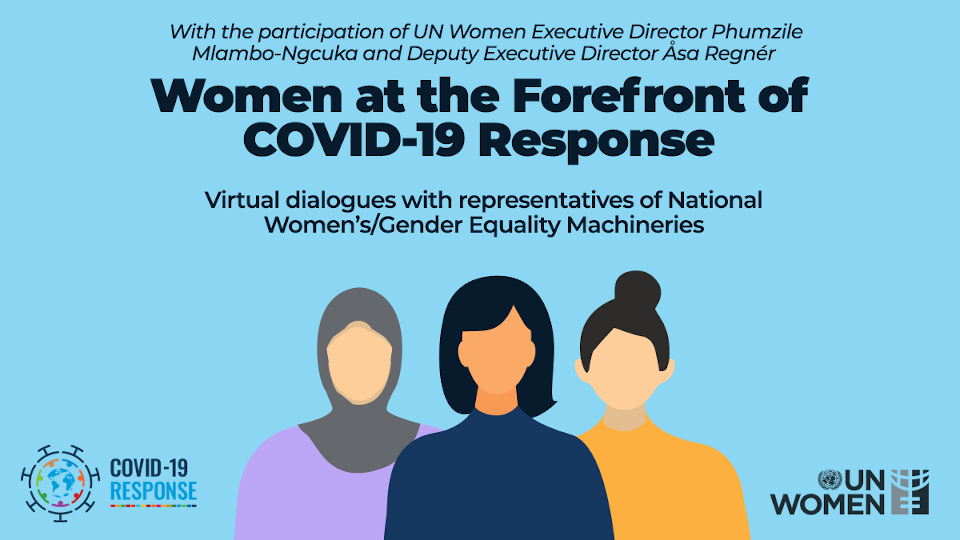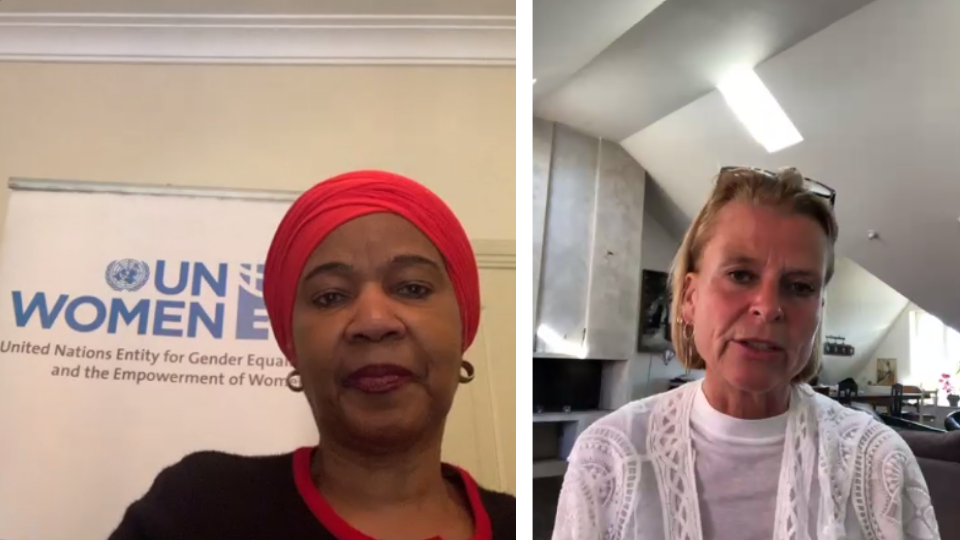“Progress on gender equality should not be reversed,” agree representatives of governmental gender equality bodies
A virtual meeting brought together highest-level UN Women officials with representatives of National Gender Equality Machineries from the Western Balkans, Turkey, Eastern Europe, the Caucasus and Central Asia, to discuss challenges and the way forward for the gendered impact of the COVID-19 pandemic.Date:

UN Women Regional Office for Europe and Central Asia brought together representatives of National Gender Equality Machineries, official governmental structures assigned to promote gender equality, and civil society and youth representatives from 14[1] countries and territories[2] across the region to discuss challenges, best practices, and lessons learned considering the gendered dimensions of the COVID-19 pandemic.
Dr. Phumzile Mlambo-Ngcuka, UN Women Executive Director and Åsa Regnér, UN Women Deputy Executive Director participated at the meetings, which were moderated by UN Women Regional Director for Europe and Central Asia, Alia El-Yassir.
“We need concrete actions to ensure that all policies and programmes on public health protection, preparedness, resilience and response take full account of the needs of women," said UN Women Executive Director Ms. Mlambo-Ngcuka addressing the participants. “We need sisterhood and human solidarity to fight and defeat this virus. It is time for Ubuntu, ‘I am because we are’," said Ms. Mlambo-Ngcuka highlighting the need for more solidarity and humanity. She also emphasized the need for targeted financial investments to ensure women’s and girls’ needs are met during the pandemic.

Representatives of National Gender Equality machineries underlined the below priority issues during and post pandemic periods:
- Violence against women and the need to ensure continuation of services
- Importance of integrated response and multi-stakeholder work
- Gender mainstreaming in plans and budgets
- Supporting women’s labour force participation and entrepreneurship
- Increasing women’s access to and knowledge of Information and Communication Technology and digital literacy
- Availability of gender disaggregated data and statistics
- Ensuring continued health services to people, specifically those with underlying health conditions
- Working with men and boys and addressing gender stereotypes
- Working with the civil society and the youth
“The Secretary General’s report highlighted that COVID-19 could reserve the limited progress that have been made on gender equality. How do we push together positive actions to regress already existing inequalities? We can work with governments to collect and analyze data so that many economic policy decisions can be informed about women’s situation and needs,” emphasized Ms. Regnér.
His Exellency Vadym Prystaiko, the Deputy Prime Minister for European and Euro-Atlantic Integration of Ukraine, focused on the differentiated economic and social impact of the pandemic on women and men, especially the most vulnerable, and said: “To ensure gender-sensitive response to COVID-19, we are further planning to enhance sex-disaggregated data collection for policy analysis and inclusion of gender equality priorities in the economic recovery, provide priority support to women on the frontlines of the response and expand and adapt essential services for prevention and response to domestic violence.”
“COVID-19 highlighted existing inequalities. We need to create gender-sensitive recovery plans. Economic recovery is a priority and should factor in a gender perspective. Services for survivors of violence against women should not be compromised and be recognized as essential services. A particular challenge we face is lack of reporting because of lack of trust in institutions,” said Sanela Skrijelj, Deputy Minister of Labour and Social Policy of North Macedonia.
Representing the national women’s machinery of Uzbekistan, Narbaeva Tanzila Kamalovna, the Chairperson of the Senate of the Oliy Majlis, suggested proposals for a roadmap for gender equality by 2030, to be further developed by the Generation Equality Forums and Action Coalitions: “Take measures at international level to prevent a recurrence of a pandemic and to widen the economic activities of women and girls; develop projects to support women’s entrepreneurship, particularly in rural areas and create electronic marketplaces for female heads of farms and small businesses; implement reproductive health measures.”
"We urge governments to ensure that gender equality priorities are not excluded from the agenda during COVID-19. We see that the challenges that women face are complex and systemic, therefore the response should be complex and systemic. State policies and programmes need to be strengthened to ensure women’s access to health, social and psychological services. There is a desperate need to talk about new programmes to support women’s economic empowerment,” highlighted Natalia Karbowska from Ukranian Women’s Fund.
Read the summary document from the meetings for an overview of the discussions including key issues raised, conclusions and recommendations.
[1] Albania, Azerbaijan, Bosnia and Herzegovina, Georgia, Kazakhstan, Kosovo, Kyrgyzstan, Moldova, Montenegro, North Macedonia, Serbia, Turkey, Ukraine, Uzbekistan
[2] All references to Kosovo on this website should be understood to be in the context of United Nations Security Council Resolution 1244 (1999).